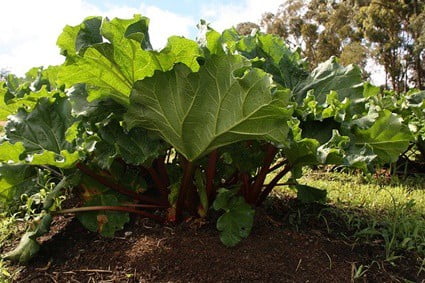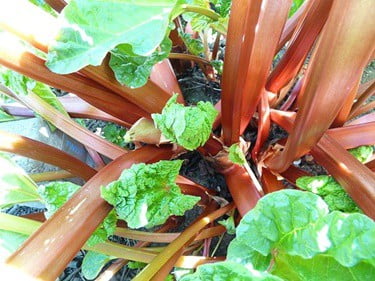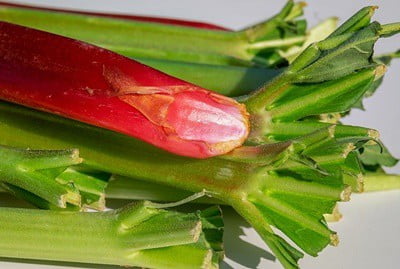Rhubarb is a vegetable with long green leaves and a white-red stalk. As a tasty and nutritious food, you may wonder if your rabbit can eat rhubarb. However, the health benefits of rhubarb do not extend to rabbits. Rather, rhubarb is bad for rabbits, even in small quantities.
All parts of the rhubarb plant are toxic to rabbits. Specifically, the most toxic parts are its leaves. This is because of the oxalic acid present in all parts of the plant. Oxalic acid toxicity can lead to a lack of appetite, weakness, and listlessness. In more serious cases, it can cause seizures, neurological damage, and even death in rabbits.
To stop your rabbit from eating rhubarb, you should know how to identify the plant. In the worst case, if your rabbit experiences rhubarb poisoning, take action and contact your vet immediately.
What Is Rhubarb?
While rhubarb is a common plant, the terminology surrounding it can be confusing. Rhubarb sometimes refers to other plants that are technically not rhubarbs. For example, it can be used to colloquially refer to the edible stalks across many vegetables. This can become a problem when identifying a toxic plant for your rabbit.
The rhubarb that is served and eaten by humans is distinguished by the term “culinary rhubarb.” This is what you’ll find in grocery stores and kitchens. Culinary rhubarb is a hybrid of two species of wild rhubarb. Namely, these are R. rhabarbarum and R. rhaponticum.
Among other plants, culinary rhubarb is easy to spot by the red tips of its stalks. These stalks can range from dark red, to light-pink, and sometimes to light green. This color is what makes rhubarb very nutritious.
One of rhubarbs’ health benefits is their high levels of anthocyanins. In practice, these compounds can help in preventing diabetes, reducing the risk of cancer, and improving motor function, among other things. However, in a rabbit, none of these benefits are found.

Why Can’t Rabbit Eat Raw Rhubarb?
Rhubarb also contains a compound called oxalic acid. This is toxic in any amount to rabbits. In fact, rhubarb that has been damaged by frost becomes even more deadly because frost damage raises the amount of oxalic acid.
The lethal dosage for rabbits hasn’t been determined. However, there are many cases that have recorded its lethal effects. The Journal of Occupational Medicine and Toxicology notes that oxalic acid poisoning can cause acute renal failure.
The effects of oxalic acid have been recorded in other animals, too. An article in Apidologie discusses how oxalic acid can be used to treat mite problems in honeybee colonies. It was found to be 99.44% effective in all the colonies that it was tested in.
When consumed, the oxalates will keep rabbits from properly absorbing calcium. Without this crucial mineral, rabbits will experience many health issues, but especially kidney failure.
Can Rabbits Eat Wild Rhubarb?
Culinary rhubarb is not the only deadly form of this plant. Common burdock, which is also called arctium minus or wild rhubarb, is also poisonous. It contains equal amounts of oxalic acid. Wild rhubarb is found throughout most of the northern United States. It typically grows in marshlands and along roadsides.
As such, unless your rabbit is allowed to roam free of your yard or home (which isn’t recommended), it’s unlikely to encounter rhubarb in the wild. Nonetheless, burdock may crop up around your yard, should you live in these areas. That makes it important to properly identify this plant, so your rabbit doesn’t accidentally find it before you do.
How To Identify Rhubarb
Rhubarb has very clear features, making it possible to distinguish it from other harmless plants. Just be sure to evaluate its three main parts:
Rhubarb Stalk
The most unique feature of the rhubarb plant is its stalk. It can be red, pink, or green in color. This color develops because of the presence of anthocyanin.
Rhubarb Leaves
You can also identify the rhubarb plant through its leaves. The leaves are large, triangular in shape, and often deep-green in color. Beyond this, the most obvious trait is their wrinkled shape and light-colored veins.
Rhubarb Flowers
The rhubarb can also be identified by its flowers. These small flowers can be greenish-white to rose-red in color. The flowers can be found in clusters, arranged in branches.
Is Rhubarb OK for Rabbits?
Rhubarb should never be fed to rabbits, even in small amounts. Bunnies have a more sensitive digestive system and a smaller body. This means that oxalic acid can be at a smaller dosage and still be dangerous.
Rhubarb Greens And Stalks
Because they are edible for humans, you might think that the greens and stalks of rhubarb are safe for your rabbit. However, this isn’t the case. All parts of the rhubarb plant contain oxalic acid and are therefore poisonous to your rabbit.
However, the stalks contain the least amount. If your rabbit eats a bite or two, it may not experience the worst of the poisoning. Nonetheless, it will still be poisoned, so you should not take this lightly.
Rhubarb Leaves
The leaves of the rhubarb plant are perhaps the most dangerous part for your rabbits. This is because they contain the most concentrated amount of oxalic acid.
In fact, there are such high levels of oxalic acid in the leaves that it’s not safe for consumption even by humans. Between 5 and 15 grams can kill a person, who has the advantage of body mass over a rabbit. If your rabbit eats any part of the leaves, take it to a vet right away.
Raw Rhubarb
Raw rhubarb is poisonous to rabbits. In the wild, rabbits will naturally avoid raw rhubarb. In fact, rhubarbs are used by farmers to deter wild rabbits from their crops. They can be an effective border against wild animals, as they will sense the poisonous nature of this plant.
Domesticated rabbits, however, may lack this instinct. Pet rabbits have been bred to be trusting towards their owners. As such, your pet rabbit will likely eat whatever is handed to it, provided the taste isn’t bad.
If your rabbit appears to avoid rhubarb, that is good news. However, it’s likely due to the finicky nature of domesticated rabbits, rather than any wild instinct. It’s still unwise to leave your bunny unattended around this poisonous plant.
Cooked Rhubarb
Rhubarb is commonly made into a pie and can also be found in tarts and other pastries. This is not good to feed to your rabbits.
In addition to the toxicity, the added sugars in any dish with rhubarb can be harmful to your rabbit. No need to add insult to injury!
What To Do If a Rabbit Eats Rhubarb
If your rabbit happens to consume rhubarb, it’s important that you take immediate action. Perhaps the rabbit munched on a piece that fell to the floor while you were cooking.
All rhubarb in any dose is poisonous to rabbits. However, the severity of their symptoms may vary, based on the amount of rhubarb they ate. The parts they consumed will also play a role.
For example, if a large rabbit consumes a few bites of rhubarb stalk before you catch it, a trip to the vet may see it fully recovered. It may not even experience long-term side-effects. However, a small rabbit that eats more rhubarb leaf may experience organ damage, nerve failure, and death.
Identify how much rhubarb has been eaten. This can tell you how bad the effects are likely to be. Check the plant for bite marks or missing leaves. With this knowledge, you can inform the vet of the possible dosage of oxalic acid. This helps the vet act more quickly and precisely to help your rabbit.

Symptoms of Rhubarb Poisoning in Rabbits
Even if you don’t witness your rabbit consuming rhubarb, you can still spot the signs of rhubarb poisoning. This will show itself in a variety of symptoms, which may appear immediately or within a few hours after consuming the plant. Symptoms include:
- Lethargy and weakness
- Listlessness
- Loss of appetite
- Digestive problems
- Seizures
In some serious cases, rhubarb poisoning can lead to neurological damage or death. If you notice these symptoms, take further action.
Rhubarb Toxicity Treatment
Any symptom of poisoning in rabbits should be treated as soon as possible. If you believe that your rabbit has ingested rhubarb, be sure to call your vet immediately. It’s not a condition that should be weathered at home. Likewise, it’s not something your rabbit can walk off.
Your vet will examine the rabbit and determine if its symptoms are caused by oxalic acid poisoning. Once confirmed, your vet will provide emergency medical treatment. This will include ensuring that no other toxins are affecting your pet. An antidote will be prescribed by your doctor.
In more serious cases, your rabbit may need life-maintaining measures. This can include artificial respiration, as well as an IV drip.
After the treatment is completed, your rabbit will be allowed to go home with you. However, you will still be required to keep the bunny under close supervision. This includes watching for additional symptoms and alerting your vet if the rabbit doesn’t appear to be recovering.
Most importantly, keep your rabbit in a contained space where it has ample access to water. It’s very important for it to stay hydrated. This will help alleviate the dehydration its body may have undergone during the poisoning process. It will also help the rabbit better flush the trace toxins from its system.
It’s tempting to share all your tasty, leafy food with your pet rabbit. However, this kind-hearted gesture should only be done responsibly. Instead of providing your rabbit with a taste of rhubarb as you make dinner, consider other vegetables more suited to its body. While rhubarb is a healthy treat, it’s best to stick to safer options.

